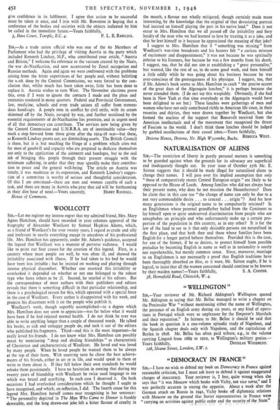NATURALISATION OF ALIENS
Sia,—The restriction of liberty in purely personal matters is something to be guarded against when the grounds for its advocacy are superficial and inadequately thought out. In your issue of October 25th Mr. E. Sutton suggests that it should be made illegal for naturalised aliens to change their names. I will pass over his implied assumption that only " those of comparatively recent Central European origin " are likely to be opposed to the House of Lords. Among families who did not always bear their present name, why does he not mention the Mountbattens? Does he claim that in this case too " the change of name can only be due to a not very commendable desire . . . to conceal . . . origin "? And for how many generations is the original name to be compulsorily retained? Is an Englishman whose paternal grandfather hailed from the Continent to lay himself open to quite undeserved discrimination from people who are xenophobes on principle and who unfortunately make up a certain pro- portion of the population in this country, as in any other? It is for the law of the land to see to it that only desirable persons are naturalised in the first place, and that both they and those whose families have been English for a longer period behave themselves. Provided this is the case, for one of the former, if he so desires, to protect himself from possible prejudice by becoming English in name as well as in nationality is surely not reprehensible, but merely common sense. Since, moreover, marriage to an Englishman is not necessarily a proof that English traditions have been thoroughly absorbed en bloc, as it were, Mr. Sutton ought, if he is logical, to insist that all the women concerned should continue to be known


































 Previous page
Previous page